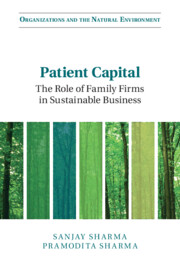Book contents
- Patient Capital
- Organizations and the Natural Environment
- Patient Capital
- Copyright page
- Contents
- Figures
- Tables
- Preface
- 1 Definitions
- 2 Primary Data: Cases from the Winery Industry in Canada, France, and Chile
- 3 Exogenous Drivers of Corporate Environmental Sustainability Strategy
- 4 Organizational Drivers of Corporate Environmental Sustainability Strategy
- 5 Managerial Drivers of Environmental Sustainability Strategy
- 6 Bringing the Family into the Corporate Environmental Sustainability Strategy: Implications for Research, Education, and Policy
- Index
- References
2 - Primary Data: Cases from the Winery Industry in Canada, France, and Chile
Published online by Cambridge University Press: 12 July 2019
- Patient Capital
- Organizations and the Natural Environment
- Patient Capital
- Copyright page
- Contents
- Figures
- Tables
- Preface
- 1 Definitions
- 2 Primary Data: Cases from the Winery Industry in Canada, France, and Chile
- 3 Exogenous Drivers of Corporate Environmental Sustainability Strategy
- 4 Organizational Drivers of Corporate Environmental Sustainability Strategy
- 5 Managerial Drivers of Environmental Sustainability Strategy
- 6 Bringing the Family into the Corporate Environmental Sustainability Strategy: Implications for Research, Education, and Policy
- Index
- References
Summary
In order to build theory on the role of family firms in investing patient capital for long-term sustainability strategies, we supplemented the literature review with empirical case studies to generate a thicker description of the phenomenon and to embed the arguments in practice. In subsequent chapters of this monograph, discussions and theory development is illustrated with examples drawn from these case studies. In order to generate an understanding of the core phenomenon, the cases were selected to allow comparison between family and non-family controlled firms operating in similar institutional, legal, political, and societal environments. To control for exogenous influences, the winery industry was chosen due to similararity in products, services, activities, supply chains, markets, industry standards, and similar institutional contexts across regions in Canada, France, and Chile represented in both New World and Old World wineries. The winery industry exhibits a range of governance structures from corporate wineries to multi-generational firms to first generation and lifestyle firms, allowing comparisons on the core concepts examined.
Keywords
- Type
- Chapter
- Information
- Patient CapitalThe Role of Family Firms in Sustainable Business, pp. 25 - 56Publisher: Cambridge University PressPrint publication year: 2019

